| Srl | Item |
| 1 |
ID:
105249
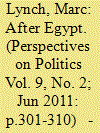

|
|
|
|
|
| Publication |
2011.
|
| Summary/Abstract |
The uprisings which swept across the Arab world beginning in December 2010 pose a serious challenge to many of the core findings of the political science literature focused on the durability of the authoritarian Middle Eastern state. The impact of social media on contentious politics represents one of the many areas which will require significant new thinking. The dramatic change in the information environment over the last decade has changed individual competencies, the ability to organize for collective action, and the transmission of information from the local to the international level. It has also strengthened some of the core competencies of authoritarian states even as it has undermined others. The long term evolution of a new kind of public sphere may matter more than immediate political outcomes, however. Rigorous testing of competing hypotheses about the impact of the new social media will require not only conceptual development but also the use of new kinds of data analysis not traditionally adopted in Middle East area studies.
|
|
|
|
|
|
|
|
|
|
|
|
|
|
|
|
| 2 |
ID:
090710


|
|
|
|
|
| Publication |
2009.
|
| Summary/Abstract |
Uri Bar-Joseph and Jack S. Levy look at the different ways in which the conscious distortion of information and the politicization of intelligence can lead to intelligence failure. They apply their categories to the Soviet failure to anticipate the German attack in 1941 and to the Israeli failure to anticipate the Arab attack in 1973.
|
|
|
|
|
|
|
|
|
|
|
|
|
|
|
|
| 3 |
ID:
130659
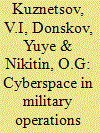

|
|
|
|
|
| Publication |
2014.
|
| Summary/Abstract |
The authors examine the relationship between battlespace, cyberspace, and information environment from the perspective of combat actions conducted by tactical military formations in our day.
|
|
|
|
|
|
|
|
|
|
|
|
|
|
|
|
| 4 |
ID:
104076
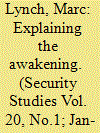

|
|
|
|
|
| Publication |
2011.
|
| Summary/Abstract |
This article explores the reasons for the dramatic change in Sunni Arab Iraqi attitudes toward the United States from 2004 to 2007, which made possible the "Awakenings," local groups of mostly Sunni tribes and former insurgents that decided to cooperate with the United States against al Qaeda in Iraq. While there have been many studies of the military strategy, there has been little attention paid to the reasons for the underlying attitude change. This article argues that the dramatic changes in the information environment and in the nature of direct contacts across a range of Sunni society played a crucial role. It draws on a wide range of Arabic language primary sources that have generally been neglected in U.S. military-centric accounts. No single dialogue flipped the Sunnis, and the change would not likely have happened without the material changes underpinning their interests. But years of ongoing, intensive dialogues across a wide range of interlocutors reshaped the foundations of the relationship and to convince those involved individuals of the possibility of a strategic shift. American counterinsurgency (COIN) doctrine and the surge helped by proliferating the points of contact with Iraqis and by transforming the relations at the individual level. This has broad implications for key debates in contemporary U.S. foreign policy, as well as for counterinsurgency and international relations (IR) theory.
|
|
|
|
|
|
|
|
|
|
|
|
|
|
|
|
| 5 |
ID:
133347
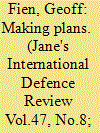

|
|
|
|
|
| Publication |
2014.
|
| Summary/Abstract |
The US Navy (USN's) consolidated afloat networks and enterprise services (CANES) combines five legacy systems into a single package, helping the navy streamline subport, training and operational procedures abroad ships.
|
|
|
|
|
|
|
|
|
|
|
|
|
|
|
|
| 6 |
ID:
138186
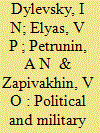

|
|
|
|
|
| Summary/Abstract |
The authors look at the political and military aspects of the Russian Federation's state policy on international information security and the guidelines to be followed to counter military and political threat of aggressive use of information and communication technologies.
|
|
|
|
|
|
|
|
|
|
|
|
|
|
|
|
| 7 |
ID:
127409
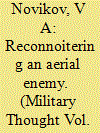

|
|
|
|
|
| Publication |
2013.
|
| Summary/Abstract |
The author examines the control structure of reconnaissance to collect information about an aerial enemy and advances arguments in support of his approaches to improving control effectiveness. He also puts forward an algorithm for selecting a rational method for establishing an information environment to control antiaircraft fire.
|
|
|
|
|
|
|
|
|
|
|
|
|
|
|
|
| 8 |
ID:
114033
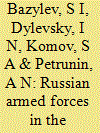

|
|
|
|
|
| Publication |
2012.
|
| Summary/Abstract |
The authors draw on the record of modern-day armed conflicts and practices followed in operational training of troops and staffs to come up with a system of principles and rules guiding the Russian Armed Forces' behavior in cyberspace operations and confidence-building measures that, they believe, could maximize the opportunities offered by the global information environment for reinforcing the country's defense capabilities, containing and preventing military conflicts, promoting cooperation in the military field, and developing an international information security system.
|
|
|
|
|
|
|
|
|
|
|
|
|
|
|
|
| 9 |
ID:
184012
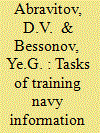

|
|
|
|
|
| Summary/Abstract |
The authors address tasks of training information support specialists with a focus on the specifics of RF naval operations. They consider distinctive features of work in the present-day information environment. Prospects of specialists' information support of military-political work are described. Examples from information support practices in the interests of the US Department of Defense are given. Two aspects of training specialists stand out as conclusions: scientific methodology and teaching methods.
|
|
|
|
|
|
|
|
|
|
|
|
|
|
|
|